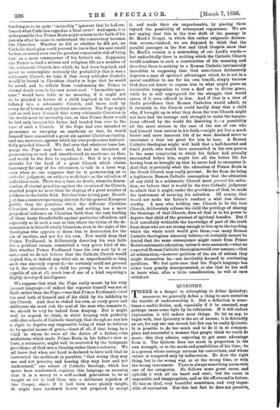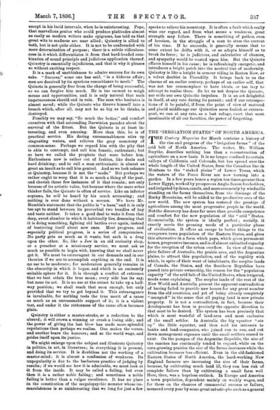QIJIXOTRY.
THERE is a danger in attempting to define Qnixotry; moreover, we generally define a thing to save ourselves the trouble of understanding it. But a definition is some- times a useful fiction, and, especially if it be unsound, may perhaps cause some light by its refutation. If it will endure explanation, it will endure most things. So let us say, to begin with, that Quixotry is the art of excess; it is distinctly an art, for any one can exceed, but few can be really Quixotic. It is possible to do too much and to do it in so common- place and successful a manner that people think we could do more; this they admire, expecting to get some advantage from it. The Quixote does too much in proportion to his own strength, or to the needs and possibilities of his time; he is a person whose courage outruns his convictions, and whose valour is tempered only by indiscretion. He does the right thing, but in the wrong way, or at the wrong time, or with the wrong instrument. There is always something amiss with one of the categories. He follows some great cause, and upholds it with all his heart and soul; but the cause is impossible and inappropriate, and so his efforts end in failure. He has an ideal, very beautiful sometimes, and very impos- sible of realisation. But this last fact he does not perceive,
except in his lucid intervals, when he is uninteresting. Pope, that marvellous genius who could produce platitudes almost as easily as modern writers make epigrams, has told us that great wits to madness are near allied ; Qnixotry is allied to 'both, but is not quite either. It is not to be confounded with mere determination of purpose; there is a subtle ridiculous- ness in it which differentiates it from that hard-headed cora- hination of sound principle and judicious application thereof. -Quixotry is essentially injudicious, and that is why it pleases as without exciting respect.
It is a mark of snobbishness to admire success for its own "Success," some one has said, "is a hideous affair; -men are deceived by its spurious resemblance to merit." The Quixote is generally free from the charge of being successful, eo we can forgive him much. He is too earnest to weigh means and opportunities, and it is only natural that such impetuousness should end in ruin. The man who hesitates is almost saved; while the Quixote who throws himself into a breach which, after all, may not be so big as he thinks, is destroyed.
Possibly we may say, "So much the better," and comfort -ourselves with that astounding Darwinian paradox about the -survival of the fittest. But the Quixote is at least in- teresting, and even amusing. More than this, he is of practical service. His daring unreasonableness stirs up stagnating waters, and relieves the grey monotony of -common-sense. Perhaps we regard him with the pity that is akin to contempt, and call him fanatic, enthusiast; but so have we called the prophets that were before him. Enthusiasm now is rather out of fashion, like duels and bard drinking; and to call a man enthusiastic is almost as great an insult as to call him genteel. And so we look askance -at Quixotry, because it is not the "mode." But perhaps we rather ought to weep that it is so much a thing of the past, and cherish those few instances of it that remain; not only because of its artistic value, but because where the more sober thinker fails, the Quixote is often of service. Like an inferior soprano, he will be heard by his much screaming ; and nothing is ever done without a scream. We have Mr. Bumble's statement that the public is "a bass," and it is only too apt to stand between its proverbial two bundles of hay and taste neither. It takes a good deal to wake it from that deep, sweet slumber in which it habitually lies, dreaming that it is doing something, fighting old battles over again, instead -of bestirring itself about new ones. Most progress, and .especially political progress, is a series of compromises. No party gets as much as it wants, but each is a drag upon the other. So, like a Jew in an old curiosity shop, or a preacher at a missionary service, we must ask as much as possible to begin with, knowing that we shall never get it. We must be extravagant in our demands and in our theories if we are to accomplish anything in the end. It is 'no use to be moderate; for moderation generally remains in the obscurity in which it began, and which is an eminently 'suitable sphere for it. It is through a conflict of extremes that we best attain the true mean ; every side has its say, -but none its act. It is no use at the outset to take up a half- way position; we shall reach that soon enough, but only provided that we try to get beyond it. This extravagance is invaluable, for nothing tests the true merit of a cause .as much as an unreasonable support of it; it is a violent test, and under it the rottenness of the cause often becomes plain.
Q aixotry is either a master-stroke, or a reduction to the :absurd; it will crown a winning or crush a losing side; and the power of giving the last blow has made more splendid -reputations than perhaps we realise. One makes the verses, and another bears the honours; and so the world wags, and prides itself upon its justice.
We might enlarge upon the subject and illustrate Quixotry in politics, in art, in literature; in everything it is present, and doing its service. It is doubtless not the working of a -master-mind; it is almost a confession of weakness. Its nnpopnlarity is due to the barbarous practice of judging by 'results; if we would see how it is admirable, we must look at it from the inside. It may be called a failing, but even then it is a rather noble failing ; and sometimes a noble failing is better than a vulgar excellence. It has no place an the constitution of the megalopsychic monster whose im- maculateness is so uninteresting that we long for just a few
specks to relieve his monotony. It is often a fault which really wins our regard, and from what seems a weakness, great strength may follow. There is something of pathos, even of heroism, in the struggle of a man to stem the current of his time. If he succeeds, it generally means that to some extent he drifts with it, or so adapts himself as to break its force ; he is judicious, and calculative of chances, and sympathy would be wasted upon him. But the Quixote effaces himself in his cause; he is refreshingly energetic, and introduces a bright patch into the neutral tint of modernity. Quixotry is like a knight in armour riding in Rotten Row, or a velvet doublet in Piccadilly. It brings back to us the charms of an earlier century, perhaps of an earlier self, that was not too commonplace to have ideals, or too lazy to attempt to realise them. So let us not despise the Quixote, nor stifle our own Quixotic impulses. It is an art delightful in itself, at any rate daring its pursuit ; and if our retrospec- tions of it be painful, if from the point of view of matured and placid middle-age our Quixotics seem foolish or extrava- gant, we can at any rate, as a last refuge, exert that most inestimable of all our faculties, the power of forgetting.







































 Previous page
Previous page